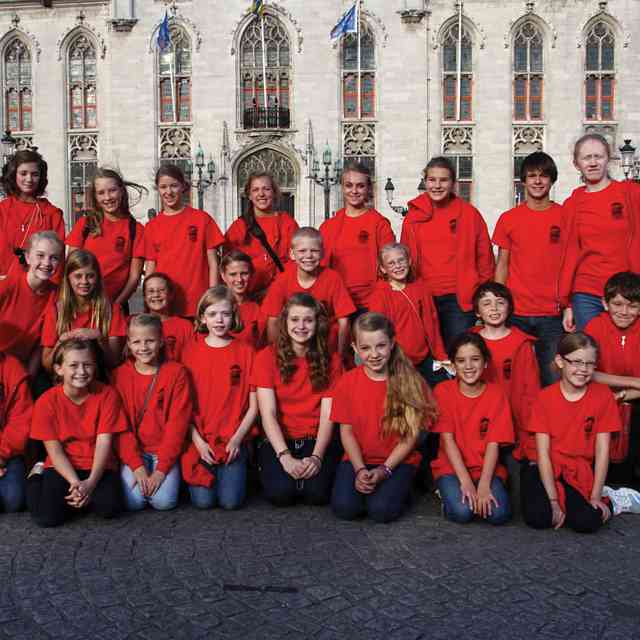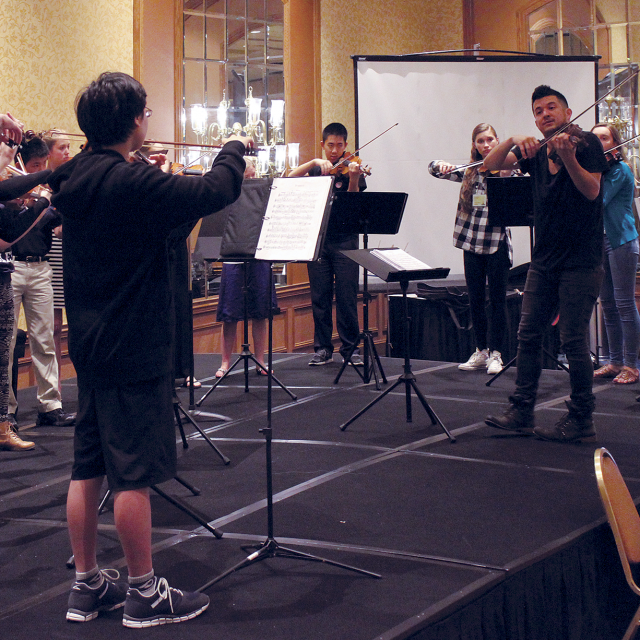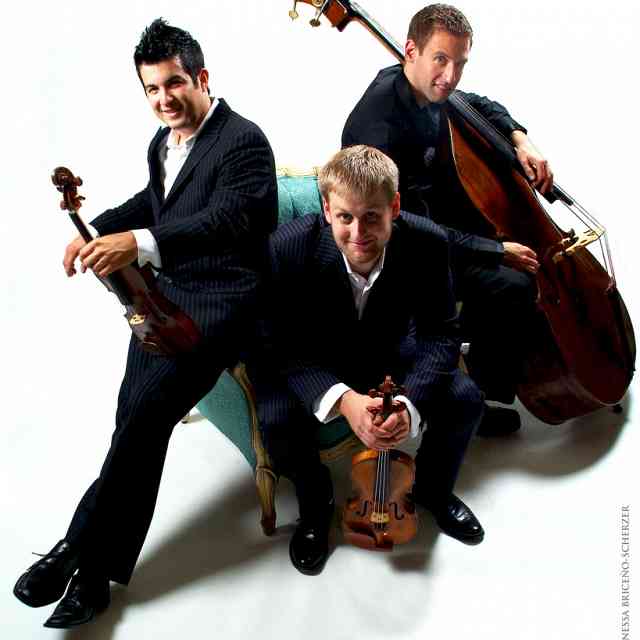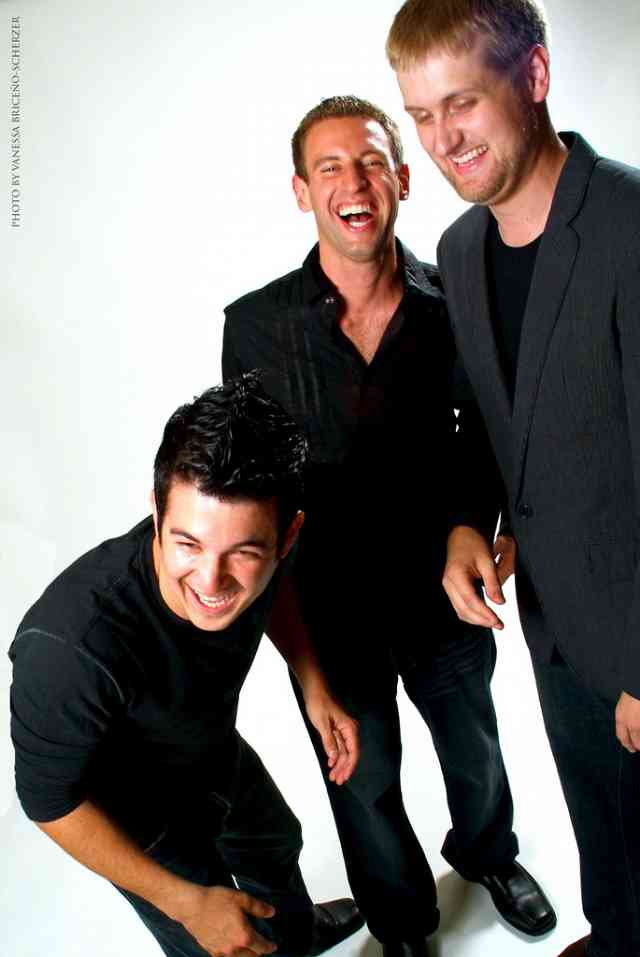
Time for Three members Nicolas Kendall, Ranaan Meyer, and Zachary De Pue. Photo by Vanessa Briceño.
Violinists Nick Kendall and Zach DePue and bassist Ranaan Meyer are three classically-trained musicians with a penchant for improvisation, hybrid genres, and playful performances. They make up the trio Time for Three, which will be performing Sunday, May 27, at the 2012 SAA Conference in Minneapolis.
I spoke with Nick (grandson of American Suzuki pioneer John Kendall) as he was preparing for Tf3’s March 8 debut at Carnegie Hall as soloists with the Boston Pops Orchestra. They performed Travels in Time for Three, an improvisational concerto in four movements written for the group by Chris Brubeck.
Travels in Time for Three celebrates jazz within Time for Three’s voice. Tell me about that.
Working with a guy like Chris Brubeck, he’s the son of Dave Brubeck, the pianist, you’ve got to go there. Time for Three is a group that, music is a language for us, and it comes in all different forms and ways of expression, different styles, and jazz is something that we love to do. Ranaan Meyer, our bass player, he fell in love with music through jazz. It seemed appropriate that we wanted to do this project. We also knew that the way we play, and the way we could hear an orchestra involved, would be very original-sounding but keep with the jazz flavor. And it’s all different styles—within jazz you have all sorts of different styles, you have bebop, you have straight-edge jazz, you have swing, you have fiddle even, even a little Irish—the second movement has kind of a hint or Irish/Celtic music with a sort of funk groove behind it. That’s one of our favorite movements.
The way we did this piece was a completely collaborative experience with Chris. A lot of times in the classical world, you’ll have a group or a soloist or an ensemble that will commission a composer and the composer will go off into their own space and come back with a piece. Well, in this case, Chris really made us perfectly tailored suits. We had a lot to say and a lot of desires—we met for about three or four days in Philadelphia about four summers ago and had sharing sessions and jam sessions, all of which were recorded. Chris basically took some of those ideas and ran with them.
You have said that when you three met at Curtis, you were the only ones among your contemporaries who were improvising. Why do think that is?
I think over the last ten years, at least in the classical music world, there’s been a kind of a major shift in attitude. I think especially because of the rich American heritage music that we have, there’s a lot of influence of the music that young musicians have grown up experiencing. For Ranaan, Zach and myself, we live in different parts of the country, and as kids, besides practicing and playing and loving classical music, we all had normal kid lives—we all had friends who were not classical musicians, and we listened to pop music. Me, coming from Washington, DC, a lot of urban hip hop, R&B, a lot of funk music and rock and roll—those experiences obviously fed into who I was as a musician.
In order for change to happen, there has to be a lot of room for error and acceptance of error, acceptance of failure.
So, improvising was part of what I loved to do as a kid—playing in bands and all these varying forms of musical expression. So, when we were at Curtis, it was still a very new thing, because Curtis is a very traditional school, and even ten or eleven years ago, even though there was an awareness of it as a tradition, we didn’t know exactly how that all fit in. But now, like I said, a decade later—it’s interesting, there are a few kids who, when Time for Three played in the middle of America, we’d play for high school students or whatever—we’ve actually seen how a couple of those students who were avid fiddlers in their small towns are now getting into Curtis as classical musicians, but started as fiddlers. So, it’s a shift, and a very steady one. Not only that, composers, the people who craft the content, the same thing is happening for them—they’re coming from America, they’ve grown up listening to pop music or played in rock bands and have written for their bands, and now they want to start writing for the orchestra, or not only the orchestra but the kind of experiences that happen within a concert hall. It’s really, really cool.
It’s very exciting. There are a lot of young musicians who are doing weird things, and I mean weird as a compliment.
Oh, yeah. Off-the-wall, experimental, pushing the boundaries. What’s great about it is in order for change to happen, there has to be a lot of room for error and acceptance of error, acceptance of failure. I think one aspect of why it’s been hard for traditional conservatories to figure out how to model this is so much of what they’re built on is excellence, and it’s been about upholding such a rich tradition, and keeping the sophistication and the depth makes that kind of experience so enriching—how do you coach and source these experiments to happen on that kind of level? It’s been hard but it’s been a very natural progression. We do think that because of a group like Time for Three, and others, especially coming from Curtis, we have shown how it can be done. And it’s only one way of doing it, by the way—it’s so great, now we hear at Curtis, especially in the twenty-first century music class, all these “weird” ensembles—an oboe, a harp, percussion and piano—I’m totally making up that group, though it sounds pretty interesting…
The Suzuki method just completely enhanced my inner creativity and provoked me to think outside the box.
Actually, about two weeks ago, Curtis officially signed for a three-year residency with Eighth Blackbird. Eighth Blackbird is a very out-of-the-box contemporary music ensemble. What they’re going to be doing at Curtis is so outside the box, advocating for inclusion of other genres and different performance spaces and ways to present music, without excluding the already amazing repertoire that exists.
What was it about your upbringing musically that allowed you to let your hair down?
It’s because of Suzuki—it’s a combination of my family values, which came from my grandfather, and the fact that I studied Suzuki. Because we are all professional musicians in the field—when I was a kid, we had [family members who were] professionals in the field, people knew in my family that having music in my sister’s and my lives, and our cousins’, was more of a quality of life thing, rather than necessarily forging professional musicians. So, it was part of a routine, and of course, the Suzuki method, especially in the early years, is so incredible as far as building that foundation for youngsters having music in their lives. But it was definitely because I had already a very acute aural development—I was very good with my ear always, and so obviously the Suzuki method just completely enhanced my inner creativity and provoked me to think outside the box.
Also, I’m half Japanese, and early on as a kid, I traveled to Japan all the time, and I was always eating Japanese food and I was seeing those wild cultural festivals, which is very different from the American scene—right off the bat, I had all these really enriching, diverse, wonderful experiences. One of the first musical things I remember as a kid were these big traditional drums, taiko drumming. My mom said that at the early age of two-and-a-half to three, instead of shying away from this mammoth sound, I was actually very curious… which actually led me to become a percussionist as well.
Besides your Suzuki repertoire, what else did you listen to over and over as a kid?
As a young youngster, Beethoven’s Eroica Symphony, Beethoven’s Fifth, pretty much all the Beethoven symphonies; Peter and the Wolf was a huge favorite of mine, I would actually pretend to conduct an imaginary orchestra and narrate the story—it was the famous recording with Bernstein narrating the New York Phil—Vivaldi’s Four Seasons and the Concerto Grosso that I would just play over and over again. When I got to high school, I was into the hip hop genre, so it was A Tribe Called Quest, the Beastie Boys, it was Gang Starr, everything that came through Lollapalooza, I was deeply into that. Phish, I knew Phish before Phish blew up, Rage Against the Machine, all that stuff.
A lot of that hip hop influence comes through in your music video, Stronger. Do you guys have any plans to do another video any time soon? Is that on your radar?
We would love to. Time for Three’s life is very complicated. Unfortunately, the way we’re set up right now—it’s ironic that our name is Time for Three—we always need more time. This video was so overwhelming, the response, especially the emails that came in—they keep coming in—from teachers, superintendents, either telling us really, really horrible stories, or because they played this video for their school body how much it’s helped their conversations about empowerment and bullying and these issues. Because of all that, we feel like we really need to do another one, but we just need to find the right concept and find the time to do it. It’s definitely a desire of ours. We also want to record another album, which we’re very much due to do.
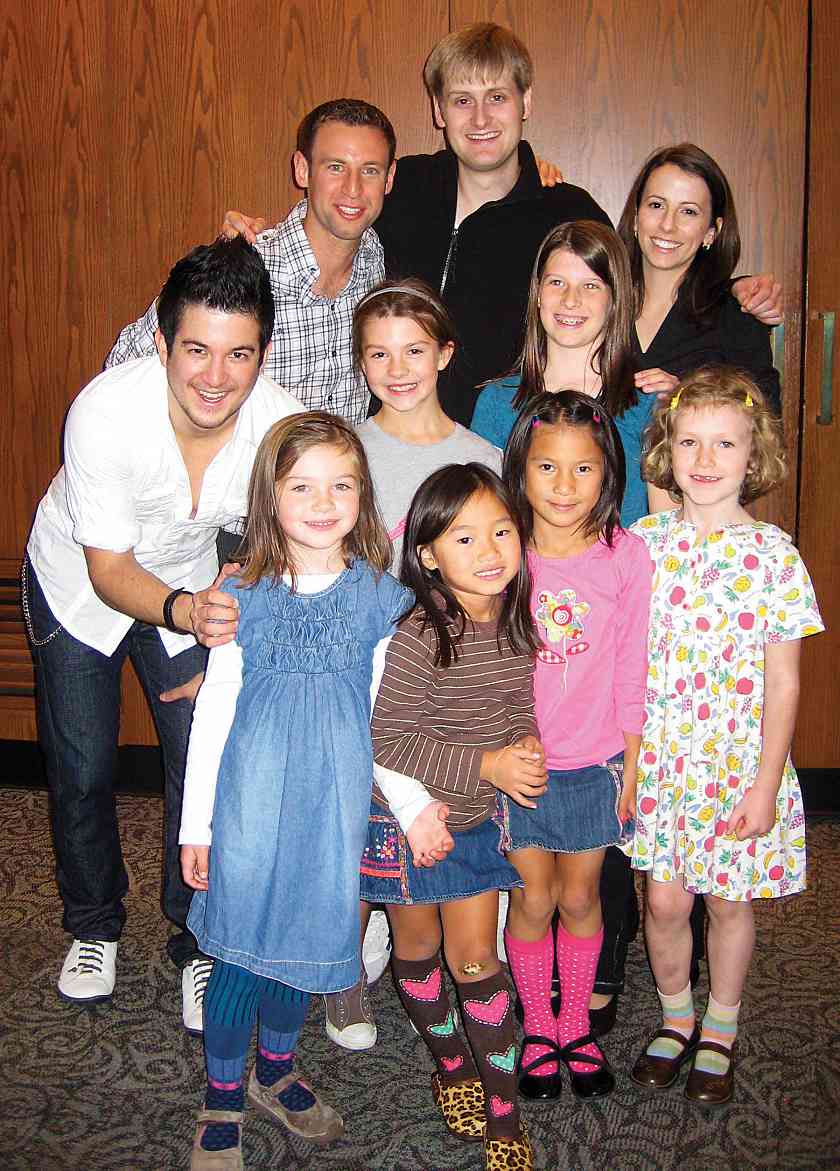
Time for Three Nick Kendall, Ranaan Meyer, Zach De Pue, and Suzuki violin teacher Meg Lanfear with her students from Oak Park Suzuki School after a performance with the Elgin Symphony Orchestra in Elgin, IL, in October 2010
Tell me about the kind of outreach that you do and why that’s important for you guys.
It’s been very interesting how we show up to these outreach programs now, and either the kids have already seen the video, so we have the visceral reaction coming through the door, which is wonderful—it feels really great to have the kids know who we are, especially with this message—or we have been screening it during our presentation. But the most wonderful thing is to see the conversations that take place, and I’m talking fifth, sixth, seventh graders, who are very young, but they definitely understand, and within that comfy situation are sometimes able to really speak honestly about how they feel or what they’ve seen. It’s been very touching. It’s an awesome feeling—and I use the word awesome in its true meaning. It’s unbelievable to be able to be the dispenser of that and to inspire kids to really talk like that, to be advocates as to why being creative and why putting all of that energy towards something creative is such a wonderful, exciting thing in life. We are an example of how that creative energy can be put to something very positive. That’s been a major plus.
Who were some of your mentors who gave you that sense of passion for music?
It of course started from my grandfather, watching him teach. Even though he didn’t want to be my full teacher, he always gave me coaching. But it was through really hanging out with him—his care towards the earth and nature and life in general, his reverence for life was huge. So much of my time with him early on was spent in the woodshed, or doing gardening, with the chickens, helping dig a lake with a big tractor, things like this. Then, of course, having the opportunity to work with him on my violin. But I think in my musical life, one of my most influential teachers was Ronda Cole. She’s from the Washington, DC, area. She completely coaxed out of me the kid through music. There’s a playful quality of music, and that every moment is like a new corner of the playroom. It was like I was always in the sandbox, working with her. I really have to say that so much of my love for music making during my adolescence, from middle school through eighth or ninth grade, was because of her infusion of joy in creating music. Also, her group classes were so much fun, and so invigorating, and very high level.
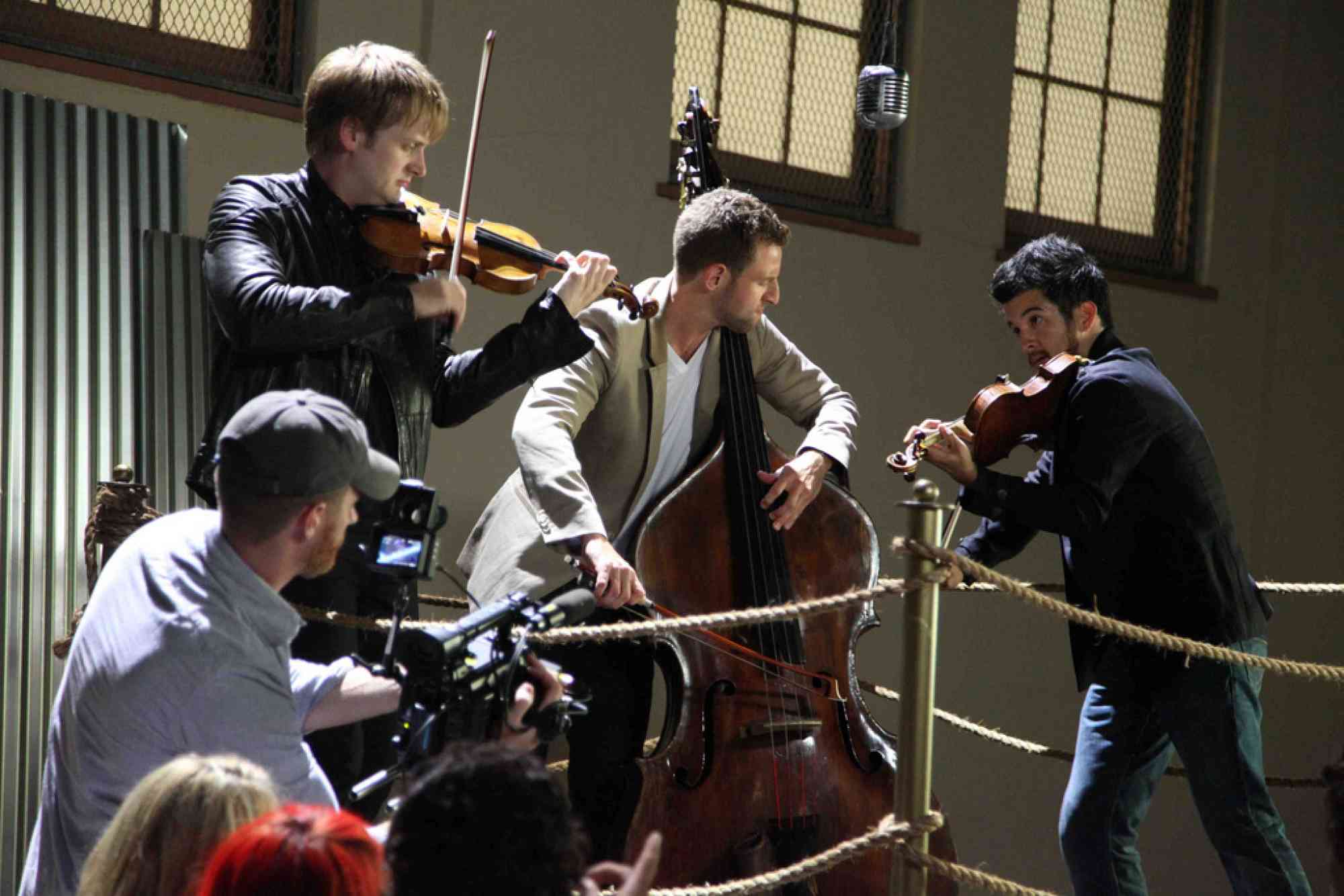
Time for Three filming the “Stronger” video
I feel like that’s something I can see when I watch videos online of Tf3 performing. There is a very playful quality to your music. Is that something that you still strive for?
It’s the old bow on the head, the Witch’s Dance. It’s the fact that through the Suzuki Method and through the philosophy Suzuki had, it’s okay to have fun while playing—in fact, it’s a must, it’s encouraged, is the sole reason why Time for Three plays, it’s the sole reason why we’re able to communicate with such a broad audience, most of which don’t go to classical music concerts, and why we are able to do such creative programs when we solo with symphony orchestras across the country. That’s predominantly what we’re doing now; we’re actually playing most of our stuff with orchestras, and it’s great to have the experience fully uninhibited, and the orchestra and musicians and the community embrace it. The effect of Time for Three when we play, is, “Oh my gosh, the walls are broken down, you guys are having such an incredible time and you’re so free of your instruments, the instruments are really serving your voice and your way of expression, we feel invited to participate”—all of those qualities come from the great mind of Dr. Suzuki and what he set out to do for a human being having a voice in music.
What do you think is important in nurturing the next generation of classical musicians?
I really feel like it’s the love of playing music. It’s love. I think the most important thing is to remember that playing music is a life experience. It’s the ability to communicate and it’s the ability to feel something on a very profound level within yourself. It’s important to not get caught up in the details too much, but to always see the bigger picture. It shouldn’t be about perfection, it should be about reaching goals.
The most important thing is to remember that playing music is a life experience. It’s the ability to communicate and it’s the ability to feel something on a very profound level within yourself.
Could you imagine your character without the influence of music?
Absolutely not. I think music has contributed to my love of life and the fact that I’m always looking at things in a positive way, I’m always thinking of things as what are the possibilities. It has allowed me to have incredible perspective as far as business concerns, but most importantly about my relationships—on the personal level, but also friendships—it has given me such an understanding of myself.
Can you share your favorite Suzuki memory?
There’s that famous moment when, I think it was in Minneapolis at a Suzuki conference, where I almost pushed my grandfather off stage—that’s sort of galvanized in my mind. There’s so many thousands of them. One of the most exciting moments was when Ronda Cole allowed me to dress up as a gypsy in a group recital, and I played Zigeunerweisen dressed as a gypsy. I remember, that was very, “You mean I can do that?” That’s definitely a memory I hold—there are so many.
We hope that Nick will get to relive some of those favorite memories and make some more at the 2012 SAA Conference. Time for Three will perform on Sunday evening. Tickets are available online or by phone at the SAA office.

